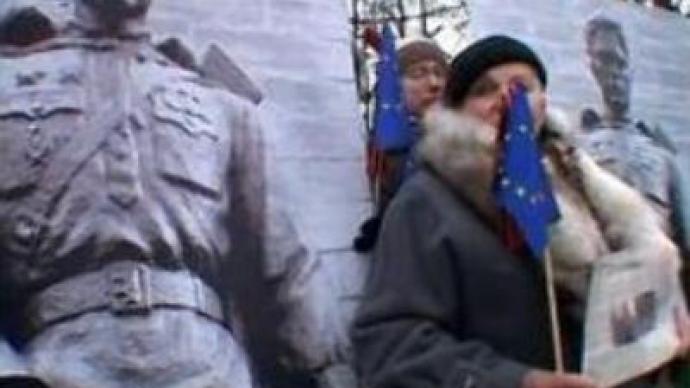Civic organisations to guard Bronze Soldier in Tallinn

Several Russian-speaking civic organisations have decided to set up an anti-crisis headquarters in Estonia’s capital Tallinn and look after the “Bronze Soldier” monument.
The move comes after the country’s parliament approved the WW 2 monuments bill.The activists are worried as the legislative initiative of the Estonian parliament allows memorials to Soviet soldiers, who died fighting Nazi forces, to be re-located and the soldiers' remains to be re-buried. But Estonian President Tomas Ilves has refused to sign the bill into law, saying it contradicts the Estonian Constitution.“The president will officially announce his decision after he receives the bill from the parliament; but several contradictions with the Constitution are obvious,” says Toomas Sildam, spokesman for the Estonian president. “And, as the president is the watchdog of the Constitution, he cannot sign the bill. It will not take effect, since next week is the last week of parliament. It will remain just a piece of paper.” Demonstrators in Tallinn accuse the Estonian government of trying to re-write history, saying the move has become part of the country’s unfinished efforts to destroy the legacy of its Soviet past. “If we are in Europe, if we want to be polite to everybody, then this has to stay,” stresses Arthur Tamme, a protester. “It is history and not possible to cancel, to garbage it. And in meantime the people want to put [instead], maybe, a Nazis monument, maybe Hitler… and all the world understands, who was right, who was not, how many millions people died for our peace.” Originally initiated by the Reform Party, together with the Nationalist Res Publica faction, the third and final reading of the bill saw 46 in favour, and 44 against. The government says its motive is to protect the sanctity of the Bronze Soldier. It argues it has an obligation to honour the war dead. And the statue's current site – a rallying point for extremists – does not allowing the statue to be treated with all the dignity it deserves. The Reform Party says it must respect the wishes of those who see the statue as a symbol of Soviet occupation of Estonia during WW 2. “There is no country who wants to have a certain spot which is destabilising the relations between different groups of its population,” explains Raivo Jarvi of Estonian Reform Party. “So, probably, if we will remove it to a proper place where it is not so attractive, I would say, for extremist events, then, I think, we will live in peace.” So close to Estonia's election on March 4, the issue has become heavily politicised. With some opponents accusing the government of trying to curry favour with Nationalists ahead of the vote. Estonia's Social Democratic Party, which has consistently opposed the bill, now warns the issue could split rather than consolidate Estonian society. Parliament also passed a law to change the day that marked the 1944 liberation from Nazi forces (Septemper 22) into a celebration of resistance to Soviet rule. Both bills have provoked strong indignation in Russia, which accuses Estonia of taking steps towards legalising fascism. Russian Foreign Minister, Sergey Lavrov, has denounced the bill as blasphemous, a severe blow to Russia-Estonia relations. But under Estonian law, a bill passed by parliament can only come into force if approved by the president. And so far the president has refused to give the go-ahead. The bill is likely to be passed back to parliament for yet further amendments which could be the start of a long ball-game between the parliament and the president.
You can share this story on social media:












